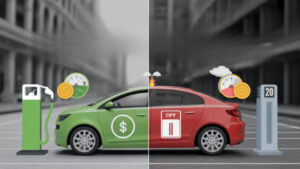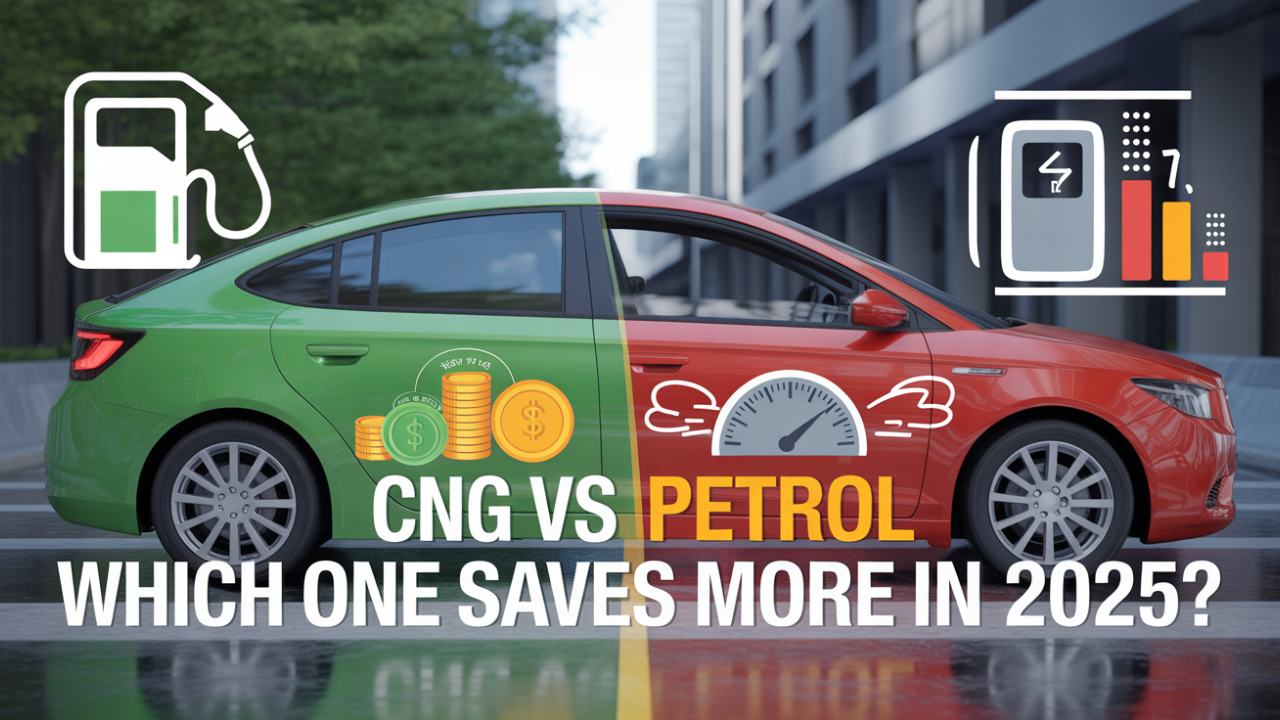With rising fuel prices and increasing environmental concerns, Indian car buyers today are faced with a crucial question: Should I buy a CNG car or stick with petrol? While petrol cars have long been the default choice for personal vehicles, CNG (Compressed Natural Gas) has become a popular alternative, especially in urban areas where running costs and emissions matter most.
1. Running Cost: CNG Wins
One of the biggest advantages of CNG over petrol is the lower running cost. CNG is significantly cheaper than petrol, making it the preferred option for people with high daily usage.
Fuel Cost Comparison (as of July 2025 in Delhi):
-
CNG Price: ₹74/kg
-
Petrol Price: ₹104/litre
Mileage:
-
CNG Cars: 25–32 km/kg
-
Petrol Cars: 16–20 km/litre
Cost per Km:
-
CNG: ₹2.3–₹3.0/km
-
Petrol: ₹5.2–₹6.5/km
✅ Verdict: If your daily running exceeds 30–40 km, CNG offers significant savings over time.
2. Purchase Price: Petrol is Cheaper
CNG cars usually cost ₹80,000 to ₹1,20,000 more than their petrol counterparts due to the added CNG kit and components.
Example: Maruti WagonR (2025)
-
Petrol variant: ₹5.7 lakh
-
CNG variant: ₹6.6 lakh
So, while CNG saves money in the long run, you’ll need to pay a higher upfront amount initially.
✅ Verdict: Petrol cars are more affordable to buy, but CNG makes up for the difference in long-term usage.
3. Performance and Power: Petrol Leads
Petrol engines deliver better performance, higher power output, and smoother acceleration. CNG cars usually feel less powerful, especially when fully loaded or going uphill.
-
Petrol Cars: Instant throttle response, more torque
-
CNG Cars: Slight delay in acceleration, reduced performance when AC is on
However, for daily city commuting, the performance difference is minimal and manageable for most users.
✅ Verdict: If you prioritize performance, driving fun, or highway use, petrol is better.

4. Maintenance and Longevity
CNG Cars:
-
Need more frequent servicing due to dual-fuel system
-
Require valve adjustments and timely spark plug changes
-
Tank inspections every 3 years
Petrol Cars:
-
Simpler engines, easier maintenance
-
Lower parts wear and tear
-
Fewer visits to service stations
Though modern CNG systems are safer and more reliable, they still require special attention, especially for older models.
✅ Verdict: Petrol cars are lower maintenance and more long-lasting in the long run.
5. Boot Space and Practicality
In factory-fitted CNG cars, the CNG cylinder eats up a large portion of the boot space, making it inconvenient for long trips or carrying luggage.
-
CNG boot space: Significantly reduced
-
Petrol boot space: Full capacity
This limitation can be frustrating for families or those who travel frequently with luggage.
✅ Verdict: Petrol cars are more practical for weekend getaways or family travel.
6. Availability of CNG Stations
CNG availability in India is growing rapidly, especially in metro cities and Tier-1 towns. However, it still remains limited in many semi-urban and rural areas.
Current Reach (as of 2025):
-
Over 6,000 CNG stations across India
-
Expanding into new states like Tamil Nadu, West Bengal, and North-East
If you live in Delhi, Mumbai, Pune, Ahmedabad, Lucknow, or Bengaluru, CNG infrastructure is reliable. Elsewhere, it may be difficult to find a CNG filling station on long journeys.
✅ Verdict: Petrol cars offer greater freedom and flexibility across India.
7. Environmental Impact: CNG is Cleaner
CNG is considered a greener fuel with significantly lower carbon emissions compared to petrol.
-
CNG emits: ~25% less CO₂ and almost zero particulate matter
-
Petrol emits: More CO₂ and contributes to urban pollution
With India moving toward sustainable mobility, choosing CNG is also a conscious step toward eco-friendliness.
✅ Verdict: CNG is the better option for the environment.
8. Factory-Fitted CNG vs Aftermarket Kits
Car manufacturers like Maruti Suzuki, Hyundai, and Tata now offer factory-fitted CNG variants that are safer, better integrated, and come with warranty.
Aftermarket CNG kits, though cheaper, may:
-
Void your car’s warranty
-
Be unsafe if not fitted properly
-
Reduce engine life if not maintained well
✅ Verdict: Always prefer OEM/factory-fitted CNG vehicles over retrofitting kits.
9. Ideal Users: Who Should Choose What?
CNG is ideal for:
-
Daily commuters with long city drives (30+ km/day)
-
Cab drivers, delivery partners, or shared mobility users
-
Environmentally conscious individuals
-
Budget-focused buyers willing to trade performance for savings
Petrol is ideal for:
-
Occasional users or short-distance drivers
-
Performance lovers and highway travelers
-
Residents in areas with no CNG availability
-
Buyers who want low initial cost and fewer hassles
10. Resale Value: CNG Catching Up
Earlier, CNG cars had lower resale value due to fears around engine wear and CNG availability. But in 2025, with better infrastructure and public awareness, resale value of CNG vehicles has improved significantly — especially for OEM CNG variants.
Petrol cars still have wider resale appeal, but the gap is closing fast.
CNG vs Petrol: Quick Comparison Table
| Feature | CNG Car | Petrol Car |
|---|---|---|
| Purchase Cost | Higher | Lower |
| Running Cost | Low (~₹2.5/km) | High (~₹6/km) |
| Mileage | 25–32 km/kg | 16–20 km/l |
| Performance | Moderate | High |
| Maintenance | Medium | Low |
| Boot Space | Less | Full |
| CNG Availability | City-only | Nationwide |
| Eco-Friendliness | High | Moderate |
| Ideal For | City use, high running | All-purpose use |
| Resale Value | Improving | Stable
|
Disclaimer
Prices and mileage figures are approximate and may vary by location and model. Always consult local dealerships and government fuel boards for the latest updates.
Add more:
Own XUV 3XO Now with Just ₹1 Lakh!

2 thoughts on “CNG vs Petrol: Which Fuel Saves You More in 2025?”